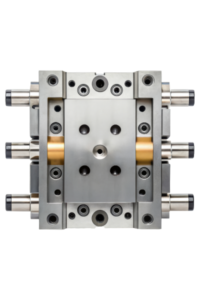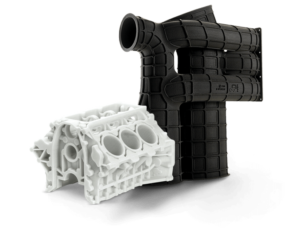Sustainability has been a hot topic for several years, and companies, under pressure from consumers and governments, have made pledges to reduce their carbon footprint and be friendlier to the planet. The use of plastics has become controversial in some circles, but being a good steward of our environment and manufacturing plastic products aren’t necessarily at odds with one another. In this post, we will talk about the growth of corporate sustainability initiatives and how you can produce injection-molded products with a sustainability focus.
Growth of Corporate Sustainability Initiatives
Corporate Social Responsibility (CSR), although not officially coined at the time, has roots that stretch back centuries. Initially centered around philanthropy, it later evolved to encompass broader social and environmental concerns. However, it wasn’t until 2005 that the phrase Environmental, Social, & Governance (ESG) gained prominence. A few years later, the concept of sustainability became increasingly prevalent, coinciding with governments taking an active role in mandating environmental practices.
Today, nearly all (96%) of the top 250 companies worldwide report on sustainability. Businesses face intense scrutiny from investors and customers. Customers are a big driver, putting profits at risk for companies that don’t assimilate. An Aflac Survey showed that over three-quarters of consumers reported a preference for supporting companies that demonstrate a genuine commitment to bettering our world. Additionally, 73% of investors (adults who own individual stocks) feel that a company’s social and environmental improvement initiatives contribute positively to stockholder returns. With profits on the line, companies are actively seeking sustainable options.
Injection Molding With a Focus on Product Sustainability
Thanks to advancements in materials and processes, injection molding is increasingly becoming a topic in sustainability discussions. This manufacturing method is recognized for its efficiency and precision, which can significantly contribute to environmental responsibility while meeting consumer demands.
Plastic is often criticized for its environmental impact, relying predominantly on petrochemical processing, and being extremely carbon heavy to manufacture. However, conversely, it aligns with sustainability in several crucial ways contributing to resource conservation and efficiency. For instance, plastic plays a vital role in keeping food fresh for longer periods, significantly reducing waste by preventing spoilage and extending shelf life. The lightweight nature of plastics enables the production of vehicle and aerospace parts much lighter than their metal counterparts, resulting in lower fuel consumption and decreased greenhouse gas emissions. Plastics play a critical role in the manufacture and efficiency of renewable energy systems and contribute to energy efficiency and sustainability in building construction. These applications are a few that demonstrate its potential to contribute positively to sustainability efforts.
At Quickparts, we understand the importance of sustainability to many of our customers. Our commitment to innovation enables us to offer injection molding solutions that are not just dependable but also aligned with your sustainability goals. One of the key advantages of injection molding is its ability to precisely control material usage, which reduces waste and promotes a more sustainable production cycle.
We are dedicated to working closely with our clients to integrate sustainable practices into their production processes. Whether it’s through selecting eco-friendly materials, optimizing design for reduced material use, or enhancing process efficiency, we want to help you achieve your sustainability objectives.
Design for Manufacturing Increases Efficiency and Reduces Waste
One way we can positively influence how the manufacturing process impacts the environment is through Design for Manufacturability (DFM). One of the tenets of DFM is to reduce waste, which aligns with the principles of sustainable product manufacturing.
Tooling – Using an insert system means less waste when product lines become obsolete or change.
Material – DFM reduces material waste through design optimization. It can also design the part to use less material while maintaining structural integrity and quality. Material selection plays a significant role in sustainable injection molding. As interest in this area grows, there is an increasing list of viable options:
- Recyclable materials
- Recycled materials
- Biodegradable and compostable plastics
- Bioplastics
- Plastic using natural fillers
Product Design – By emphasizing simplicity in product design, complex geometries, and unnecessary tight tolerances can be reduced. Complex geometries can lead to inefficient processes, more complicated molds, and waste. When tolerances are tighter than needed, scrap can increase. Optimizing the design can reduce the risk of defects. Additionally, designing products for longer life and easy disassembly for maintenance access or end of their life can make them more sustainable. Products that last longer reduce the need for frequent replacements, and those that can be easily disassembled can be more effectively recycled or repaired. Another consideration is part standardization across products, which can reduce the number of molds needed.
Localized Production Aligns With Broader Sustainability Goals
Once hailed as a gateway to reduced costs and enhanced profitability for manufacturers, offshore manufacturing is undergoing a significant transformation. The allure of lower production expenses abroad has been upset by an escalating interest in reshoring—a trend that has gained momentum in the aftermath of the pandemic and amidst rising global tensions. This shift towards bringing manufacturing back to domestic shores is driven by a critical reevaluation of supply chain vulnerabilities exposed by recent disruptions.
Companies engaging in reshoring are proactively seizing control over their supply chains, thereby reducing their exposure to future risks and uncertainties. This strategic realignment not only enhances operational resilience but also aligns with broader sustainability goals. By consolidating production processes closer to home, businesses are better positioned to monitor and implement environmentally responsible practices, reduce carbon footprints associated with long-distance transportation, and comply with regulations.
Working on an Injection Molding Project?
Tell us about your sustainability objectives. Through DFM, material selection, and streamlined processes, we can make your project a reality. Contact us to get started.


